|
|
|
Sort Order |
|
|
|
Items / Page
|
|
|
|
|
|
|
| Srl | Item |
| 1 |
ID:
148463
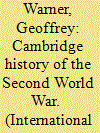

|
|
|
|
|
| Summary/Abstract |
Following on from earlier three-volume histories of the Cold War and the First World War, Cambridge University Press completes a trilogy with this detailed treatment of the Second World War. Multi-authored in the Cambridge tradition, the individual chapters cover a wide range of events and topics and the 81 contributors, mainly but not exclusively from the United Kingdom and the United States, include both scholars who have already established a reputation in the subject as well as those who are in the process of doing so. Perhaps the greatest strength of the volumes is the treatment given to what may be loosely referred to as the Pacific War. No one who uses them properly is going to have any doubts about the nature and importance of the struggle between Japan and its opponents between 1937 and 1945, and it is particularly encouraging to note the use of Chinese and Japanese sources by the authors, when so many English-language books on the subject cite none. The principal weakness of the enterprise is its division into an unnecessarily complicated series of topics, which is not always adhered to by the authors and which often compels the unfortunate reader to skip backwards and forwards, not only within but between volumes. Despite this flaw, however, this remains an important contribution to the history of the Second World War and will need to be consulted by any serious student of the subject for many years to come.
|
|
|
|
|
|
|
|
|
|
|
|
|
|
|
|
| 2 |
ID:
148458
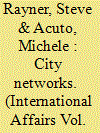

|
|
|
|
|
| Summary/Abstract |
There is today a global recognition that we live in an ‘urban age’ of near-planetary urbanization where cities are at the forefront of all sorts of agendas. Yet little attention is offered to the active role of cities as political drivers of the urban age. There might today be more than two hundred ‘city networks’ globally, with thousands of para-diplomatic connections actively defining relations between cities, international organization and corporate actors. This actively networked texture of the urban age shapes all areas of policy and, not least, international relations, and holds much promise as to possible urban solutions to global challenges. Based on an overview of a representative subset of this mass of city-to-city cooperation (n=170), this article illustrates the landscape of city networking, its issue areas and institutional shapes, and its critical features. As we argue, city networks today are faced by a crucial challenge: while trying to overcome state-centric ‘gridlocks’ cities are, at the same time, building both political–economic as well as very material ‘lock-ins’. We need to pay serious attention to this impact of city diplomacy in international affairs, developing a greater appreciation of the path dependencies and responsibilities this diplomatic activity purports.
|
|
|
|
|
|
|
|
|
|
|
|
|
|
|
|
| 3 |
ID:
148462
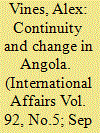

|
|
|
|
|
| Summary/Abstract |
Angola may be entering a pivotal moment, triggered by persistently low oil prices and its president José Eduardo dos Santos (the world's second longest-serving president) signalling that he may step down in 2018. Will this result in continuity or change? This review article of six books on modern Angola shows that since 1820, significant dips in international commodity prices have marked moments of lasting political change in the country. They also show that the history of Angolan nationalism is one of deep divisions and that political loyalty and support were often more about survival or ambition than about ideology and ethnicity. Throughout modern Angolan history personalities, such as Agostinho Neto, Jonas Savimbi and José Eduardo dos Santos, have also played a critical role in determining the country's fortunes. The single greatest foreign influence on Angola might be Cuba's ‘internationalist solidarity’ of sending up to five per cent of its population to Angola between 1976 and 1991 in support of the Movimento Popular de Libertação de Angola (MPLA). Over a decade later, the Chinese also found that the MPLA government determined their partnership. This review article examines the strength of Angolan agency and how the drivers of change are complex, determined by personality politics, geopolitics, prestige, solidarity, cost–benefit analysis and timing.
|
|
|
|
|
|
|
|
|
|
|
|
|
|
|
|
| 4 |
ID:
148459


|
|
|
|
|
| Summary/Abstract |
Can Germany lead on security? This article aims to address this question by looking at recent German contributions to European defence cooperation. In 2013 Germany introduced the Framework Nations Concept (FNC) as a systematic and structured approach towards joint capability development. The concept relies on the idea that bigger nations take the overall responsibility for coordinating the contributions of smaller partners in a capability package. The framework nation model as such is not new but the initiative has been welcomed as a potential game changer in European defence cooperation and as confirmation of Germany's commitment to NATO. In light of the Ukraine crisis, measures to adapt NATO and to strengthen the European pillar of the alliance have become more urgent. Allies and partners increasingly want Germany to extend its role as Europe's dominant economic and financial power to matters of security and defence. The framework nation model allows Germany to take international responsibility, while avoiding debates about leadership and hegemony. Moreover, as a framework nation, Germany can advance flexible cooperation among a smaller number of allies without undermining its commitment to multilateralism. But the FNC initiative also raises further questions: what is the added value of the framework nation model compared to similar formats; what should be the place of smaller groupings in the evolving Euro-Atlantic security architecture; and how reliable is Germany in the role of a lead nation?
|
|
|
|
|
|
|
|
|
|
|
|
|
|
|
|
| 5 |
ID:
148453


|
|
|
|
|
| Summary/Abstract |
Globally gender remains a key factor in differing health outcomes for men and women. This article analyses the particular relevance of gender for debates about global health and the role for international human rights law in supporting improved health outcomes during public health emergencies. Looking specifically at the recent Ebola and Zika outbreaks, what we find particularly troubling in both cases is the paucity of engagement with human rights language and the diverse backgrounds of women in these locations of crisis, when women-specific advice was being issued. We find the lessons that should have been learnt from the Ebola experience have not been applied in the Zika outbreak and there remains a disconnect between the international public health advice being issued and the experience of pervasive structural gender inequalities among those experiencing the crises. In both cases we find that responses at the outbreak of the crisis presume that women have economic, social or regulatory options to exercise the autonomy contained in international advice. The problem in the case of both Ebola and Zika has been that leaving structural gender inequalities out of the crisis response has further compounded those inequalities. The article argues for a contextual human rights analysis that takes into account gender as a social and economic determinant of health.
|
|
|
|
|
|
|
|
|
|
|
|
|
|
|
|
| 6 |
ID:
148461
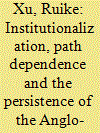

|
|
|
|
|
| Summary/Abstract |
One of the remarkable phenomena in post-Cold War world politics is the persistence of the Anglo-American special relationship (AASR) in spite of recurrent announcement of its death by pessimists. Current scholarship on Anglo-American relations largely draws on interests and sentiments to explain the persistence of the AASR, ignoring other important contributing factors such as institutionalization. This article is the first to give serious consideration to the role of institutionalization in influencing the persistence of the AASR. By using the concept of path dependence, this article argues that the high-level institutionalization in Anglo-American intelligence, nuclear and military relations plays a seminal role in contributing to the persistence of the AASR in the post-Cold War era. The institutionalized intelligence relationship is exemplified by the relationship between the UK's Government Communications Headquarters (GCHQ) and the US's National Security Agency (NSA), which is underpinned by the UKUSA Agreement. The institutionalized nuclear relationship is exemplified by a variety of Joint Working Groups (JOWOGs), which is underpinned by the 1958 Mutual Defence Agreement. The institutionalized military relationship is exemplified by routinized military personnel exchange programmes, regular joint training exercises and an extremely close defence trade partnership. The high-level institutionalization embeds habits of cooperation, solidifies interdependence and consolidates mutual trust between the UK and the US in their cooperation on intelligence, nuclear and military issues.
|
|
|
|
|
|
|
|
|
|
|
|
|
|
|
|
| 7 |
ID:
148460


|
|
|
|
|
| Summary/Abstract |
This article discusses the case of the Allied Democratic Forces (ADF) rebel group in the Democratic Republic of Congo (DRC). It shows how a variety of actors that have opposed the ADF group have framed the rebels to achieve a range of political and economic objectives, or in response to organizational and individual limitations. The DRC and Ugandan governments have each framed ADF in pursuit of regional, international and national goals separate from their stated desires to eliminate the armed group. The UN stabilization mission in Congo's (MONUSCO) understanding of the ADF was influenced by organizational limitations and the shortcomings of individual analysts, producing flawed assessments and ineffective policy decisions. Indeed, the many ‘faces’ of ADF tell us more about the ADF's adversaries than they do about the rebels themselves. The article shows how the policies towards the ADF may not be directly related to defeating a rebel threat, but rather enable the framers (e.g. DRC and Ugandan governments) to pursue various political and economic objectives, or lead the framers to pursue misguided operational plans (e.g. MONUSCO). In doing so, the article highlights more broadly the importance of the production of knowledge on conflicts and rebel groups: the way in which a rebel group is instrumentalized, or in which organizational structure impact on the understanding of the rebel group, are crucial not only in understanding the context, but also in understanding the interventions on the ground.
|
|
|
|
|
|
|
|
|
|
|
|
|
|
|
|
| 8 |
ID:
148454
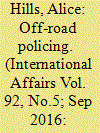

|
|
|
|
|
| Summary/Abstract |
Prompted by the trend to see information and communications technology (ICT) as a tool for capacity building, this article asks whether the use of ICT has—or can—recast centre–periphery relations in a hybrid country such as Somaliland. Taking as its departure point Herbst's observation that a fundamental problem confronting African leaders concerns how to extend or consolidate authority over sparsely settled lands, it uses recent developments in Somaliland's coast guard and immigration police to assess ICT's contribution to changing security provision in remote and coastal areas. This allows for an analysis of Somaliland's law enforcement framework, the relationship between its politics and practice, the practical application of its coercive resources, and the Silanyo government's priorities and preference for consensus and co-existence whenever security imperatives allow. It suggests that ICT can be a desirable operational tool or a variable in existing power networks, but that it does not represent a new mode of security governance. ICT's potential to connect Somaliland's government and populace, and politics and practice, is for now minimal, but identifying the ways in which security actors such as coast guards actually use ICT allows for a more accurate assessment of the variables shaping centre–periphery relations. Contrary to Herbst's observation, the Silanyo government does not need to overtly or systematically extend, consolidate or exert its authority in remote and coastal areas. Spatial metaphors such as centre–periphery help to clarify the situation, but the significance invested in them reflects western rationalities, rather than Somali realities.
|
|
|
|
|
|
|
|
|
|
|
|
|
|
|
|
| 9 |
ID:
148456
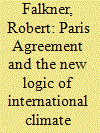

|
|
|
|
|
| Summary/Abstract |
This article reviews and assesses the outcome of the 21st Conference of the Parties (COP-21) to the United Nations Framework Convention on Climate Change (UNFCCC), held in Paris in December 2015. It argues that the Paris Agreement breaks new ground in international climate policy, by acknowledging the primacy of domestic politics in climate change and allowing countries to set their own level of ambition for climate change mitigation. It creates a framework for making voluntary pledges that can be compared and reviewed internationally, in the hope that global ambition can be increased through a process of ‘naming and shaming’. By sidestepping distributional conflicts, the Paris Agreement manages to remove one of the biggest barriers to international climate cooperation. It recognizes that none of the major powers can be forced into drastic emissions cuts. However, instead of leaving mitigation efforts to an entirely bottom-up logic, it embeds country pledges in an international system of climate accountability and a ‘ratchet mechanism’, thus offering the chance of more durable international cooperation. At the same time, it is far from clear whether the treaty can actually deliver on the urgent need to de-carbonize the global economy. The past record of climate policies suggests that governments have a tendency to express lofty aspirations but avoid tough decisions. For the Paris Agreement to make a difference, the new logic of ‘pledge and review’ will need to mobilize international and domestic pressure and generate political momentum behind more substantial climate policies worldwide. It matters, therefore, whether the Paris Agreement's new approach can be made to work.
|
|
|
|
|
|
|
|
|
|
|
|
|
|
|
|
| 10 |
ID:
148455


|
|
|
|
|
| Summary/Abstract |
This article is intended to aid the UK government in protecting the UK from cyber attacks on its Critical National Infrastructure. With a National Cyber Security Centre now being established and an updated National Cyber Security Strategy due in 2016, it is vital for the UK government to take the right approach. This article seeks to inform this approach by outlining the scope of the problems Britain faces and what action the UK government is taking to combat these threats. In doing so, it offers a series of recommendations designed to further help mitigate these threats, drive up cyber resiliency and aid recovery plans should they be required. It argues that complete engagement and partnership with private sector owner–operators of Critical National Infrastructure are vital to the success of the government's National Cyber Security Strategy. It makes the case that for cyber resiliency to be fully effective, action is needed at national and global levels requiring states and private industry better to comprehend the threat environment and the risks facing Critical National Infrastructure from cyber attacks and those responsible for them. These are problems for all developed and developing states.
|
|
|
|
|
|
|
|
|
|
|
|
|
|
|
|
| 11 |
ID:
148457


|
|
|
|
|
| Summary/Abstract |
More than two decades of nuclear dialogue between the United States and North Korea have not prevented Pyongyang from conducting four nuclear tests and building up a nuclear weapons arsenal. Putting the blame for the failure of this dialogue solely on Pyongyang ignores the hesitancy and confusion of US policy. Historical evidence suggests that the Clinton, Bush and Obama administrations consistently failed to prioritize their objectives and adopted an impatient and uncompromising negotiating strategy that contributed to this ongoing non-proliferation fiasco. Identifying US policy mistakes at important crossroads in the dialogue with Pyongyang could help to prevent similar mistakes in the future. In this regard, the following analysis suggests a new approach towards Pyongyang based on a long-term trust-building process during which North Korea would be required to cap and then gradually eliminate its nuclear weapons in return for economic assistance and normalization of relations with the United States. Importantly, the United States might have to resign itself to North Korea's keeping an independent nuclear fuel cycle under supervision of the International Atomic Energy Agency, as well as to accepting South Korea's request to independently enrich uranium and pyroprocess spent nuclear fuel. This would be a more favourable alternative to allowing North Korea to continue accumulating nuclear weapons. Moreover, if the United States continues on the Obama administration's failed policy path, then there is a better than even chance that the Korean Peninsula may slide into a nuclear arms race.
|
|
|
|
|
|
|
|
|
|
|
|
|
|
|
|
|
|
|
|
|